The Fallout series of role-playing video games have been well-received and popular since Fallout was released in 1997 as “America’s first choice in post-nuclear simulation.†Post-apocalyptic video games have been numerous, yet the Fallout games stand out for their immersion and complexity. Fallout has managed to transcend the traditional combat- and leveling-focused RPGs to satisfy players on a much deeper level.
At least, the Fallout games transcended the typical genre offering until Fallout: New Vegas. Never before has a canonical, major release Fallout game received such hedged reviews from fans and critics. Yet, New Vegas seemed to have all the ingredients of a stellar Fallout game: an expansive world, factions to meet, choices to make, and excellent casting, all centered around a sweeping and nuanced regional conflict. Why, then, did it feel incomplete? There was something missing from New Vegas that, as players and critics have remarked, makes it feel more like a really big Fallout 3 expansion rather than a Fallout game in its own right.
This article is full of spoilers for the Fallout series. Note that when I refer to “the Fallout seriesâ€, I am referring to the canonical major releases of Fallout, Fallout 2, Fallout 3, and Fallout: New Vegas.
A brief history of Fallout
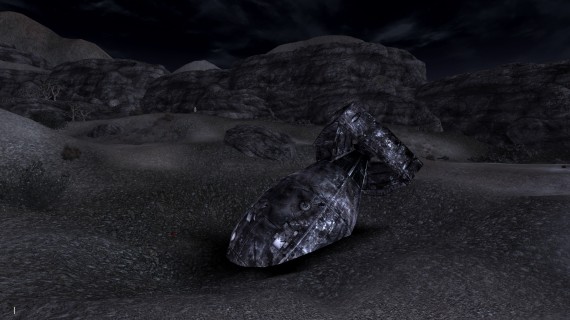
Fallout was written at a challenging time for nuclear apocalypses. The fall of Soviet Russia in 1991 had left no Cold War to go hot – there was no more beet-eating boogeyman waiting over the horizon with a sack of ICBMs. We had spent decades being just a missed phone call away from Mutually Assured Destruction, yet that had all evaporated overnight as Boris Yeltsin stood on a tank in Moscow.
The writers could have taken the easy way out by leaving the USSR as the boogeyman and chalking it all up to the alternate timeline that Fallout is set in. Thankfully, they got a lot more creative. Instead of restoring the USSR as a superpower and nuclear threat, the Fallout timeline discounts Soviet Russia’s influence after World War II: the USSR exists, but conflict is minimal or nonexistent. In Fallout’s history, the US is the unchallenged 20th century superpower after WWII.
Who to have a nuclear war with, then? The USSR’s protégé, the People’s Republic of China. Fallout’s 21st century features an increasingly desperate international community besieged by crisis after crisis: civil unrest, mysterious diseases, political and military shifts, and countries world-wide going to war over oil, water, and nuclear fuel deposits. Decades of tension and conflict culminate in a global nuclear exchange in 2077, between the United States, China, and their allies.
The choice of China is an excellent one. Their exploding population and desire for influence are easy to project in to global conflict with a United States eager to retain its economic control and quality of life. However, the real brilliance of China’s placement in the Fallout universe is that, in the real world, there has been no serious conflict between China and the US. Players carry no weight of history and dogma to cloud their immersion into the plot. While the elements of Fallout’s history are familiar, the differences set up a clean slate within which the game’s creators can reconstruct a plausible history. This familiar-but-foreign world is a critical aspect of Fallout’s immersion.
Edit: Fallout forum user Okie brings up a very important correction about US-China relations that helps drive my point:
Okie: I hate to be nitpicky about something like this but really? Korea ring a bell? There was more serious conflict between the ChiComs and the USA than there ever was between us and the Soviets.
emilio: absolutely, and i stand corrected. however, how many of the generations that play these games know the story behind the “Forgotten War”? unlike Vietnam as a proxy war with China, Korea was more a “semi-proxy” war with them. despite this, decades of propaganda and jingoism weren’t aimed at Korea and China, they were aimed at Soviet Russia.
A brief history of the player character
Each Fallout installment’s player character has a past unique to that game. You don’t play the same character between games, nor do you have the choice to play different characters in one game. This, too, is important to emotional involvement in the game, as the production can focus on the best storytelling experience for the plot.
So, what are the pre-New Vegas Fallout games about?
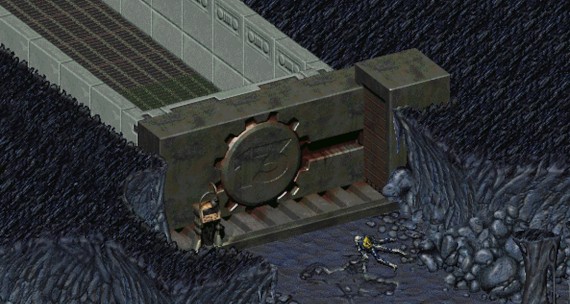
Fallout: You grow up in safety and stability as a resident of Vault 13, an inaccessible nuclear shelter. Suddenly, you are ordered to leave the security of the Vault to recover a water chip and save your people. You must venture into an unknown and likely harsh nuclear wasteland for which you are barely prepared. Upon returning, you discover that there is a bigger threat: the Master and his super mutant army.
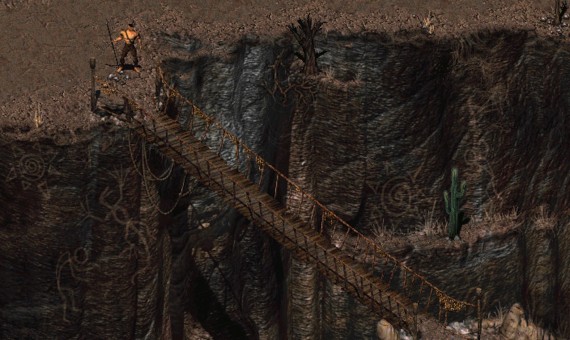
Fallout 2: You grow up in safety and stability as a resident of Arroyo, a completely isolated tribal community. Suddenly, you are asked to leave the security of your village to recover a GECK and save your people. You must venture into an unknown and likely harsh nuclear wasteland for which you are barely prepared. Upon returning, you discover that there is a bigger threat: the Enclave has taken your people.
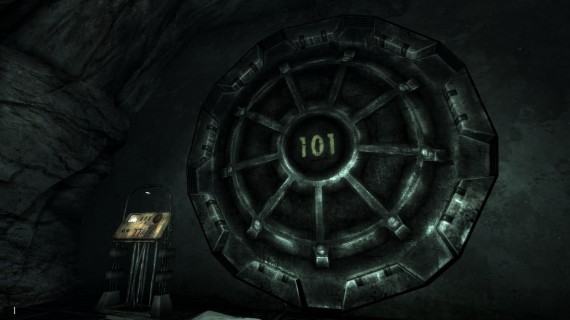
Fallout 3: You grow up in safety and stability as a resident of Vault 101, an inaccessible nuclear shelter. Suddenly, you must leave the security of the Vault to find your father and ensure the stability of your people. You must venture into an unknown and likely harsh nuclear wasteland for which you are barely prepared. Upon finding your father, you discover that there is a bigger threat: the Enclave is attempting control of the Capital Wasteland.
The Fallout archetype
The first three major Fallout games follow a narrative that is the core of their immersion and satisfaction. This satisfaction transcends the weapons and action, the joys of “Bloody Mess”, the celebrity voices (Wayne freakin’ Newton!), and even the massive and detailed game world: there is an emotional involvement built on the player character’s background and decision making opportunities.
The essential element for this emotional involvement is a player character (PC) that is initially isolated from the wasteland and naive about its nature. The PC starts in a protected community with the support of family and friends, a familiar environment, and plentiful food and water. There may be tension and trials at home, but everyone knows their life is privileged compared to the wasteland outside.
This safe, stable home is then threatened with crisis: a dwindling water supply in Vault 13, a drought in Arroyo, and political instability in Vault 101. At the command of an authority, the PC must then leave this place – leave Eden – to face an unknown world alone with nothing but a small amount of equipment and resources.

The Fallout archetype is so engaging because it mirrors the player’s relationship to the game world. I am a middle-class American who has led a safe, stable life compared to those across the globe with unimaginable hardships: I have never gone to bed hungry, never had to go to extreme measures for food and water, and never been besieged by war in my homeland. The PC has been isolated from these challenges, as well, and thus is in the same naive state of mind as your average middle-class gamer. Part of the appeal of all post-apocalyptic games is the player asking themselves “How would I do in the Apocalypse? If my world crumbled, would I have what it takes to survive?†Instead of just dropping you in to a wasteland, Fallout games have gone a step further by setting up a foundation on which you can more easily project your own life in to that of the PC’s.
A key step in this narrative is when a personal conflict gives way to a regional conflict. Your average gamer has no bearing on regional conflicts, whether they are political, economic, or martial: we’re mostly unimportant individuals, except to our friends and family. If I left my house tomorrow and someone ran up to me, begging “There is a brewing regional conflict that only you can address!â€, I would have a hard time believing them. Similarly, when the PC leaves their home, no one in the Wasteland has any reason to care about them, nor are their fates connected. The Fallout archetype does not saddle the PC with massive, history-setting responsibilities from day one; the character certainly has some important things to do, including saving lives, but this only impacts a small number of people. This not only helps avoid the disbelief that some random chump would be instantly important, as happens in many video games, but the evolving conflict provides a series of emotional stepping stones that immerse the player more and more in the choices they make.
It is within this framework that the decision-and-repercussion system of Fallout becomes so enthralling. The systems of character interaction, decision making, karma, and reputation would not be as effective without the sense that my in-game character is just as new, naive, and vulnerable to the Wasteland as I am, sitting at my computer, safe and warm. When you exit your sheltered community there really is the feeling that you have entered a new world in which you can set your destiny. The personal-to-regional conflict evolution then ups the stakes, creating an experience where the player becomes more and more aware that their actions will have long-term impact on the world around them.
New Vegas doesn’t know a Vault from a hole in the ground
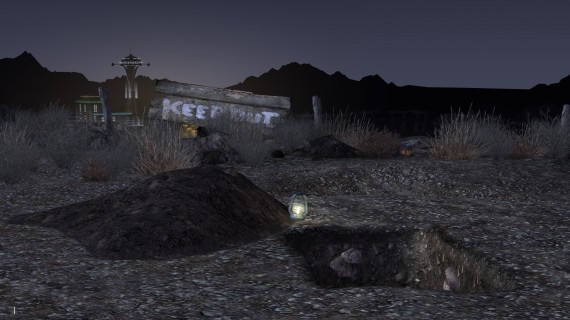
Welcome to New Vegas:
Fallout: New Vegas: You are a Mojave Express courier, tasked with surviving and navigating a harsh wasteland. There is an ongoing conflict simmering between the NCR and Caesar’s Legion. You are shot in the head by a powerful casino owner, Benny, while you’re working for an even more powerful casino owner, Mr. House. You are buried alive, then rescued by one of Mr. House’s robots. You might have amnesia. You must seek revenge on Benny, find out why Mr. House needs your help, and discover how this relates to the region-defining NCR-Legion war.
Simply put, New Vegas is missing the Fallout archetype. The character’s backstory, introduction to the wasteland, and decision-making opportunities are contrary to the immersive and continuous character progression that was the trademark of previous installments. No, New Vegas is not a ordinal Fallout game – it’s not Fallout 4. The creative staff’s desire may have been to create something different from previous canonical Fallout games, but that difference was paid in satisfaction.
The biggest contrast is that, instead of starting out as an inexperienced, sheltered character, you start as a courier: an individual supposedly savvy to the Mojave Wasteland. No coddled Vault resident or bumpkin tribal, here; you’re someone who should know the Wasteland like the back of his hand, should know the dangers out there, should know the communities and factions around New Vegas – but you don’t. Rather than an emotional player-character bond being forged around fear of and excitement for the unknown dangers beyond home, you’re just a down-on-their-luck chump in the Mojave. As far as I can tell, amnesia is never actually mentioned in the game, and only implied on a couple of occasions, so the player’s personal unfamiliarity with the world is barely explained. Amnesia is an uninspiring form of naivité: instead of genuine inexperience, you are incapacitated and inadequate. You don’t spend the game evolving the player character, you spend the game recovering them.
This backstory segues in to your harsh (re)introduction to the Wasteland. You don’t start in a safe and stable Vault or village, spurred to action by crisis; you’re shot in the head and buried alive. A shallow grave is not as comforting and sheltered as my own home. The ventures of the Vault Dweller, the Chosen One, and the Lone Wanderer are initially driven by community or kinship that the player can empathize with: part of the post-apocalyptic fantasy is not only to save yourself, but to, in some way, preserve your friends, family, and way of life. There is no love, dedication, or even ambition driving the Courier’s venture in to the wastes, just questions, revenge (a notably different moral ground to start on), and a strange robot.
The NCR-Legion war is one of the best and strongest story elements in New Vegas, as well as being closer to previous Fallout narratives than other parts of the game. Fallout games have a strong motif of examining how societies are formed and run, and New Vegas may actually exceed previous games in this respect. However, the gradual progression of pursuing a personal conflict that turns to a regional one is warped and shortened in New Vegas. The player is made aware of the NCR-Legion conflict in the game’s prologue, and the PC hears about it from nearly everyone they meet. There is no surprise turn, no twist that preys on the emotional drive developed on the fear and love compelling the PC’s first ventures in to the wastes. The PC is aware of the conflict and its significance very early on, so all that’s left is to find out how you’ll get involved.
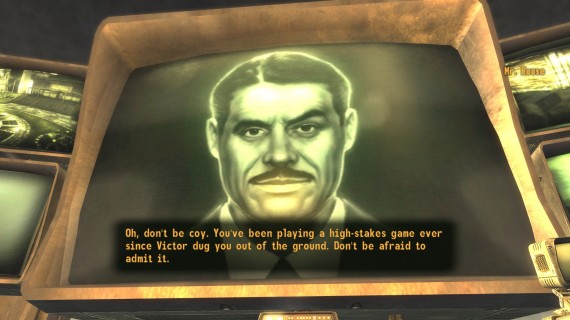
Even the vengeful, personal pursuit of Benny is paralleled by the mystery and importance of the Platinum Chip. There is simply no surprise here: you know that you’ve got to be in a fairly important game from the get-go if you’re being pawned around by casino owners grappling over a valuable object. The only surprise is what the Platinum Chip does – which doesn’t actually re-define the conflict, it just moves the odds around.
The strangest shift in New Vegas is the strikingly linear feel to the game’s beginning. Literally linear, in that you’re pointed down a road where a hundred yards from either edge lie men or beasts that will kill you in seconds, so you’d damn well better stay on that road. (Perhaps they were a little too enamored with Cormac McCarthy, which I can’t entirely blame them for: The Road was superb.) All the previous Fallout maps had an almost agoraphobic, shelter-less, panic-inducing openness: you really can go in any direction. There were safer directions to go in, and more obvious paths, but nothing felt imposed. The Lone Wanderer of Fallout 3 could, completely by chance, stumble in to Smith Casey’s Garage and emerge with his father, skipping the whole first act. That is truly Fallout-style open-world storytelling.
Down the long road
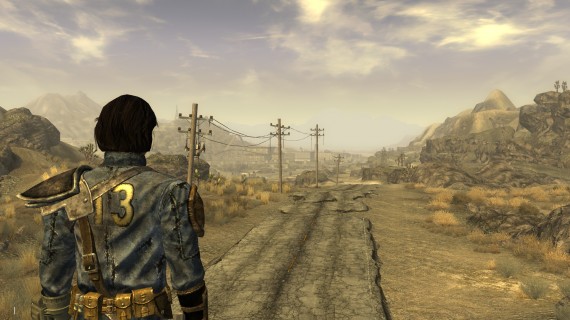
I did not write this simply to point out the flaws in Fallout: New Vegas. That would have made for a much shorter critique. Identifying the emotional elements that define the unique, immersive, and satisfying Fallout interactive narrative will help ensure they continue to be some of the best single-player games ever created.
Here are notes and recommendations for Fallout 4‘s development:
The plot and player character: Embrace the Fallout archetype, but don’t feel it should be cliché – the PC need not be from a Vault. Recognize that the core of the player-character bond is the feeling that there could be a nuclear wasteland right outside my own door. Everything else descends from this.
Return to the West Coast: New Vegas has led us back West, to where Fallout began – now it’s time to bring it all the way back. A “compressed geography†map of the Bay Area or Los Angeles would be an excellent setting (the Bay would be the most interesting terrain, plus a return to San Francisco as an important Fallout 2 location – and Sunnyvale as the Platinum Chip’s origin).
Creation Engine: I am not a fan of The Elder Scrolls series, but I am following Skyrim news for any details on the Creation Engine (CE) as that is the likely choice for Fallout 4. Gamebryo has been a good engine, but New Vegas stretched it as far as it can go. So far, the CE looks amazing for its visual quality and interaction (such as the impressively flexible-sounding AI and scripting system). Speaking of the West Coast, that locale would showcase the visual improvements of the CE better than any dusty desert or cratered valley.
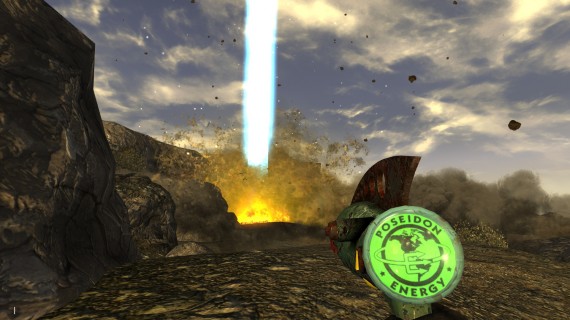
Poseidon! The Enclave! The Brotherhood! I personally enjoy the old-world factions, and their remnants, as relics struggling for relevance in a world they destroyed. Their power and technical abilities can really up the stakes in a story (as they did in 2 and 3), and they offer another perspective on how societies are built and run. Plus, the biggest mystery of Fallout lies unresolved: who dropped the first bombs – though part of me wants this to remain unanswered.
No MMO: I cannot think of something more revoltingly un-Fallout than an MMO experience. Don’t pay attention to all the people strung out on WoW and other cliche fantasy genre MMORPGs, they’re just looking for another fix. Fallout is a single-player universe that presents whole narratives akin to an engrossing movie or book (one of the only times you’ll find me agreeing with Justice Anthony Scalia). The continuous world of an MMORPG dilutes the power of storytelling and the player-character bond by impressing a larger social system that is foreign to the game: internet gamers. I don’t want to play Fallout with my friends, I don’t want to play Fallout with strangers – Fallout games are about a lone person facing a harsh world. I choose whether I want to have a companion, walk alone, find a community, destroy a community, or anything else, without the expectations or demands of other players. Even worse, the piecemeal quest requirements of a continuous world would place extended writing demands that, frankly, could lower the bar and introduce poor-quality canonical material.
No China: This is a tough recommendation to make. I really would like to see what the Fallout creators imagine for post-war China’s fate, if anything to contrast culturally-specific reactions to crisis. However, Fallout is an American game, rooted in the culture, politics, and history of the United States, and that helps to drive the player’s immersion (even for foreign players acutely aware of American culture). The broadest I can see it cast it to involve all of North America, as the United States’ wartime relations to Canada and Mexico reflect on its pre-war hawkishness and desperation. (Perhaps a relevant West Coast Fallout 4 expansion would cover the NCR invasion of Baja and its parallels to the pre-2077 US invasion of Mexico.)
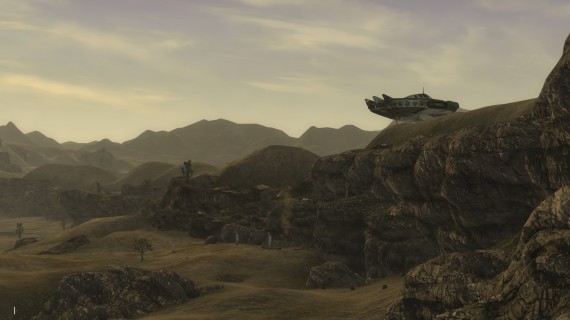
No Area 51: Mothership Zeta went too far. Aliens only belong in Fallout as a random encounter, just a little joke for those fortunate to come across them. Fallout is not about aliens or things beyond our world: Fallout is about humans and human problems (well, and former humans, too). Any fan that suggests an Area 51 expansion probably just duly works through the plot only to watch cool stuff blow up. Yes, stuff blowing up can happen quite a bit in Fallout, but it’s just bloody, nitrocellulose-scented frosting on a delicious cake of character immersion.
– emilio
Out in the sticks: New Vegas expansions
You’ve read this far, so at least this is somehow interesting (even if you disagree with me). If you happen to be an Obsidian developer then this section is especially for you.
So, how were the New Vegas expansions? (I avoid calling them “DLCsâ€, as that’s the name for a distribution method, not an actual experience.)
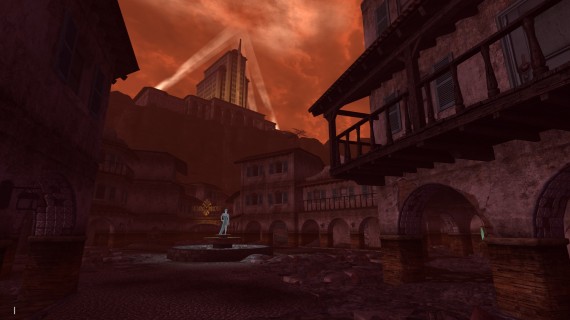
Dead Money: Dead Money had a lot of good elements going for it that were hampered by clunky storytelling. Unfortunately, some of that storytelling was restricted by the abilities of the Gamebryo engine, so it didn’t quite have the smooth experience of a polished narrative: the prologue and epilogue slide shows felt stuttered and tacked-on, and the in-game story needed a little more meat to flesh out what happened to the pre-war Sierra Madre Casino. Dean Domino and Dog/God were intriguing and enjoyable characters, but I hoped for a lot more from Christine and Elijah. The Villa areas were a little too twisted and easy to get lost in, but they made for good combat zones against the tough Ghost people.
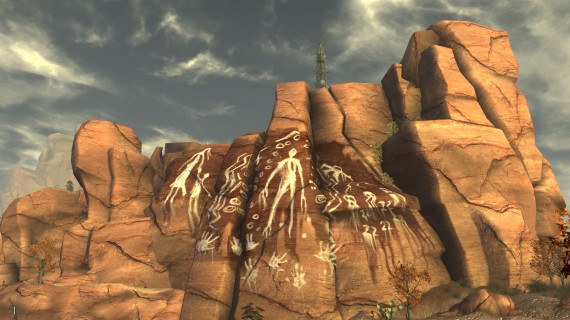

Honest Hearts: I really enjoyed what Honest Hearts brought to the table: interesting characters and a fascinating perspective of how spirituality plays in to societal and cultural development, all set in a stunning environment. The parallels drawn between the tribal’s belief in The Father in the Cave and Christianity and other traditional religions were a nuanced reflection on how crises and hardship drive spiritual development. Honest Hearts hit rocky terrain on its fairly single-track gameplay: the world is slim on choices, especially for an evil character, especially for a Legion loyalist. There really should have been an option to side with the White Legs, or at least more actively sabotage the efforts of the New Caananites, Sorrows, and Dead Horses. Instead, the evil path is simply to kill the good guys, find a map, and go home.
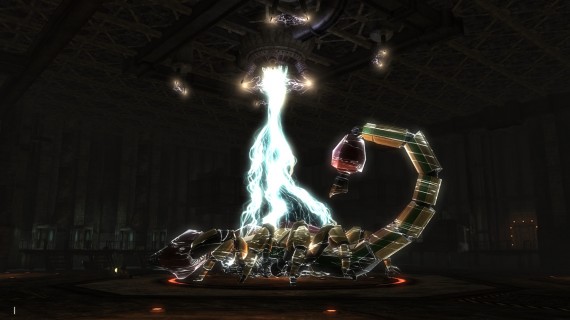
Old World Blues: Scien-tastic! Old World Blues (OWB) distilled and coalesced the sci-fi elements of Fallout in to an extremely fun and engaging experience. Fallout games often incorporate sci-fi elements of technological advance at great risk, especially the scientific and military hubris that doomed the world.  OWB embodied that in a group of crazy, arrogant scientists living in a basin of their own successes and failures. OWB also seemed a conscious response to fan reactions – reasonable and unreasonable – to the core New Vegas game and other expansions. Even the “Midnight Science Fiction Feature!†warning dialog was a tongue-in-cheek poke at bitchy fans who want their hand held in uncertain times (what the hell are you playing Fallout for, then?). Some of the changes were very welcome: in New Vegas there are remote, secluded places that you could try to get to, if there wasn’t a frustrating invisible wall there, and if you managed to get there it only had a slim chance of having anything of interest. In effect, it was not very encouraging to explore the Mojave Wasteland in detail. By contrast, Big MT seems to have stuff everywhere. Every nook and cranny, every corner of a dark lab, every tricky-to-get-to platform had something there, even if just a metal box with minor loot.
Fun fan-pandering aside, Old World Blues really gets the Tesla coil crackin’ in the voice talent and writing areas. The researchers of Big MT have the voices of pre-war authority and arrogance, never acknowledging failure before marching headlong in to the next experiment. Jim Ward as Dr. Klein (and the CIU and the Auto-Doc!) and Beau Weaver as Dr. Borous were vital to the sci-fi B-movie aesthetic, as every one of their lines sounded like a 1950’s creature feature trailer. James Urbaniak was a special treat and worked excellently for Dr. 0, exuding an insecure nerdiness without merely copying his character from The Venture Bros. – Dr. 0 lacks the ego and forced smugness or Dr. Venture.
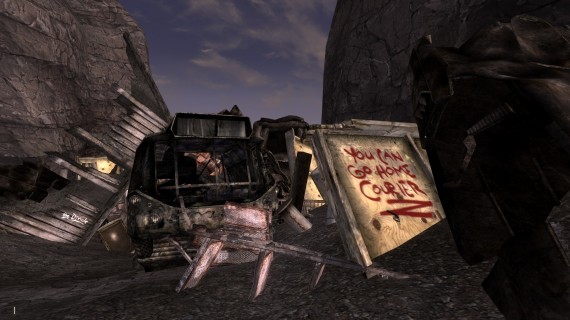
Lonesome Road: As of this writing, Lonesome Road still has a week to release. A little has been hinted at, through audio tapes in Big MT and the Bethesda Blog, but these don’t actually tell you anything about Ulysses or your history: he’s pissed, he’s coming for you, stay tuned. However, while I know little of its content, I am concerned that Lonesome Road will attempt to fill in the Courier’s possibly amnesia-fogged past with details that should have been in New Vegas in the first place. Are you really from a Vault? Mr. House’s cryogenically-preserved offspring? The love child of aliens and The King? I’m optimistic that Lonesome Road will be a good time, but it’s quite late to be injecting the personal dimension that New Vegas has been lacking.
So… What do you want to see in Fallout 4? Or if you’d like to reach me otherwise, mention it in a comment.
Fallout and Fallout 2 images from the Fallout Wiki. 10.7 broke my PPC Fallout apps!
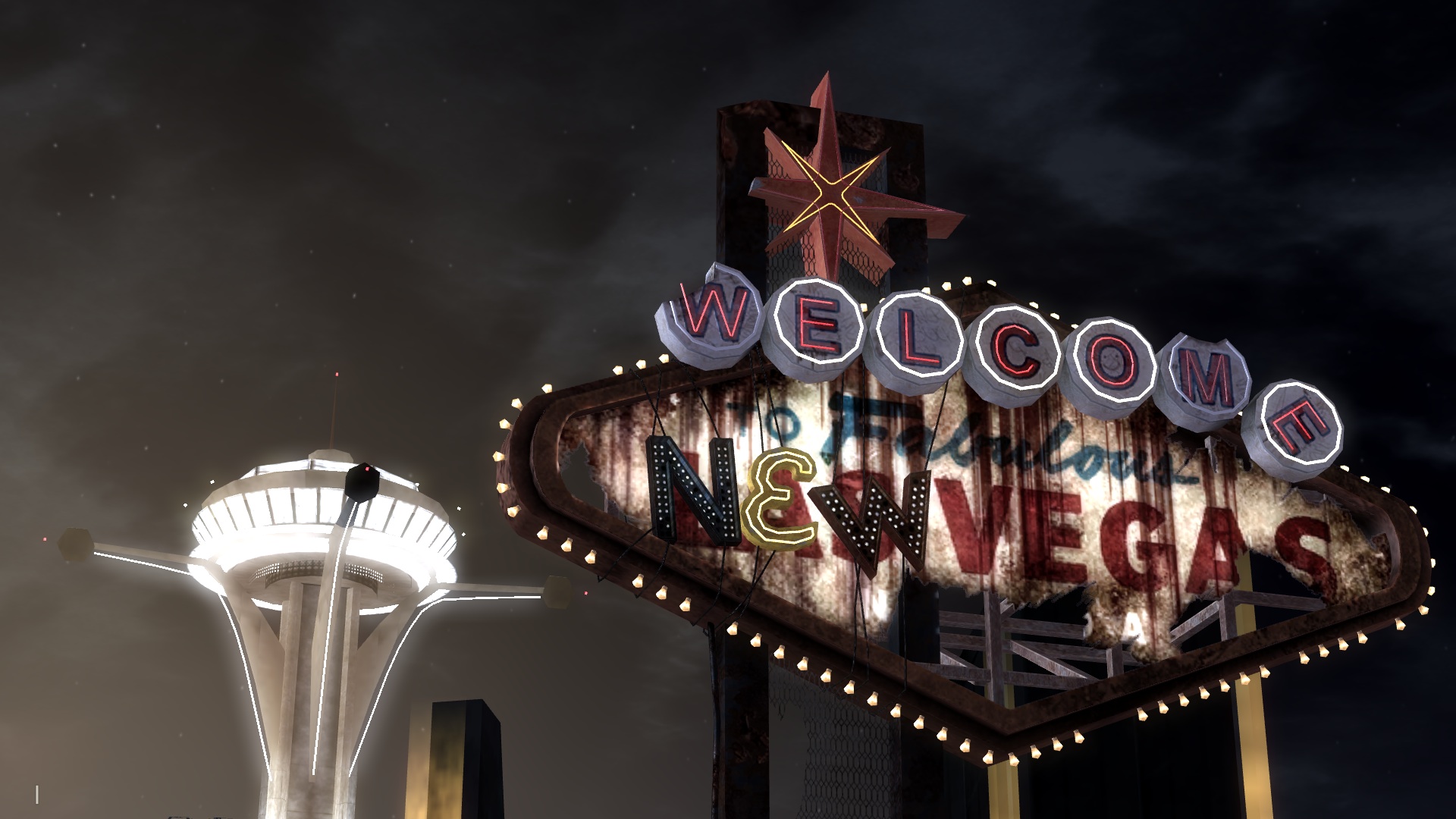
Fallout: NV, unlike the previous installments, let’s you become a truly powerful and recognized individual. The New Vegas is a land of opportunity. The fact that you’re not tied to any particular community or fraction makes it much easier for you to chose your path. Once you find out more about the NCR-Legion conflict, you realize that you can profit on it in many ways. Sure, in the previous games, the main character was powerful alright and their actions affected many people. But in F:NV, you decide the fate of the region more directly. And it’s New Vegas we’re talking about. Choices you make here will soon affect other regions.
Also, the simplicity of the main quest (disregarding it gives you four choices on how to proceed, since the choice is made relatively early) leaves much more space for the Courier’s “way towards the stars”, as it could most certainly be called.
The Couriers amnesia is pretty much obvious, as he doesn’t remember Ulysses, a character that is tied to the courier since the beginning of the game.
What you could also have mentioned is how the stories of the base and all expansions are tied together. The Lonesome road has been hinted in one of the first quests you go through.
The Area 51 expansion were not hopes for another Mothership Zeta. There’s no reason for the aliens to be involved, nor is there need for overpowered weapons that only ruin the overall experience. Instead, we’ve got the OWB, which is subjectively and objectively the best expansion of F:NV and an adequate equivalent of Area 51, which left the developers with a completely blank book to write in.
To the matter of MMO… You see, players often spend dozens of hours perfecting their character. Raising their stats as high as possible, finding them the most fitting armor, the perfect weapons, and gathering a small fortune in the process. Eventually, they get to the point, where the elements of the region are no longer challenging. Only other possible challenge are the characters of other players. That said, I don’t approve of Fallout being an MMORPG.
Different people favor different elements of the game. Some like to experience thrilling emotional story, some want to explore the unknown, others want to face new challenges.
Fallout New Vegas, in my opinion, brings most satisfaction to the competitive, great deal thanks to the increased difficulty and HC mode.
wow, im supraised how well the author “feels” Fallout world (there a lot of new kids after F3) and articulated all the things that was uncounciously unsettling about New Vegas for me. I just want to add one thing that felt diffrent from isometric Fallouts (yes im ignoring Bethesda game). It felt that the world is allready quite rebuilt. In first fallouts there was a true sense of the wasteland, rusty abandoned installations, small isolated communities etc NV feels comressed without this sense of the overwhelming destruction of the world as we know it.
Its hard to explain and express. I played FO1 and FO2 as a kid and isometric gameplay allowed me to imagine the atmosphere of post apoc, feel smell this misery. Paradoxicly in FO3 and NV everything is shown and its harder to feel “it”
ahh i wonder if Van Buren was everything i wanted from Fallout 3.
I’m afraid the author has, despite the distinct knowledge of Fallout games past and present, missed the core character conceit of New Vegas – the Courier is not a Mojave resident, but is, in fact, new to the area. They’re not amnesiac, just non-local. Dialog with Cass, especially, reveals the Courier’s origin as NCR territory. You’re expected – by both people in-game and out – to know the events of Fallout 1 and 2.
Yes, Lonesome Hearts will flesh this out considerably. But you’re not amnesiac, and I’m afraid this point undermines much of the author’s latter argument.
So no, you’re not the lovechild of Mr. House and Benny. You’re a wanderer from NCR, and you’re expected to know it. The game is made for people who’d played 1+2; the character is one who is picking up from there.
PS The edit about Korea was well-timed; otherwise I’d of noted it. It is indeed a more substantial conflict than we ever had with the USSR.
For games to ever be meaningful they have to stop being power fantasies pandering to adolescent guys. There’s absolutely nothing to be gained if Fallout continues to play up to the archetype of suburban white guy stand in leaves sheltered suburbia stand-in and saves the Wastelanders from themselves. That is pure power fantasy targeted at, admittedly, the market that will buy an open-world RPG game.
The Vault Dweller leaving the sheltered confines of the Vault to witness what humanity has done with itself after the cataclysm is an interesting take but its one of many.
You have the entirety of post-nuclear war America to be dealing with here, why confine it to power fantasy? New Vegas would be half the game it is if confined itself to the Fallout archetype. Instead, you’re some down on your luck schmuck who manages to play his cards right and place himself as the wild card. It fits perfectly with the theme of the game. You don’t have amnesia, that’s never implied. What is implied is that you’re new to the Mojave, you make something of yourself here or die in a shallow grave.
There’s so many interesting stories to be told in the Fallout world. It doesn’t need factions like the Brotherhood or Enclave to be interesting or to ‘raise the stakes’. They had their time, let’s move on. Anything can be interesting, any take, any scale of game, as long as it’s told well and with sincerity. There’s a whole rich tapestry of humanity that can be explored in Fallout and confining it to one type of power fantasy which is at its root sheltered nerd-gamer stand in nobly defeats the great evil would be a terrible loss.
Dude are you insane?? It’s not that your points aren’t arguably valid – it’s more that if you were going to write an article about something not matching a Fallout archetype, wouldn’t your go-to be Fallout 3? Yes, “the Lone Wanderer of Fallout 3 could, completely by chance, stumble in to Smith Casey’s Garage and emerge with his father, skipping the whole first act.” But if there was one thing sorely lacking in F3, it was something beyond the superficial, which FNV did in spades! In F3, there were no secrets, no mysteries, nothing to uncover. The world was as you saw, an expanse as big as your graphics processor could handle, filled with guns and baddies for those who care to spend the day finding guns and blowing up baddies. In its defense, the set design was gorgeous.
But who cares? It’s all about the mysteries, what lies beneath the surface, and FNV was filled with things to discover. It reminded me of Chinatown – what you expect is the complete opposite of what’s going on. Whereas, in F3, it was like “Hey, we’re having trouble with the ghouls, go kill them”; go kill ghouls; return for reward.
Yes, the straight forward good/bad of Legion vs. Courier was a little too straight forward. But god, what was the alternative in F3?? Nothing!
Let’s put it another way. While I was playing F3, in the opening town, I stumbled on a dead guy in the opening town – and on his person, I found a wrench. Fascinating – could this be a sly in game reference to the game Clue? That he had been murdered by a wrench, and that a killer was on the loose? And would this uncover a much darker conspiracy going on that I would have to solve?
No. Turns out, the guy died due to a glitch, in which he fell off a balcony.
Whereas I feel in Fallout New Vegas, this would have been the case – and THAT is the Fallout archetype, a fully realized world.
It’s not that your points aren’t valid – but if you’re going to write anything in this vein, shouldn’t you start with Fallout 3?
i think that Chicago should be where fallout 4 is as the brotherhood and the Enclave are there and that would be awesome. That was very well written and also had lots of details and very informative and was fun to read
I have to disagree with most of your post.
First off, the linearity of New Vegas:
You could also easily go to Vegas right at the beginning.
It’s just tough encounters that block your path. It’s no different
from Fallout 1 & 2. Where Master/Enclave patrols mean death
for anyone who doesn’t know what he’s doing.
Second, the origin:
Yes, New Vegas is different in that regard but is it worse?
Let’s look at Fallout 2. I always hated the tribal beginning because
it limits you. How can you justify tagging science, repair, guns, EW, etc.
If they’re no advanced technology in your environment?
This is where New Vegas shines, the origin doesn’t impose anything unto you.
The back story is mostly up to you and can be further defined through dialog choices.
Already know who the NCR is? Don’t ask about it. Want to play as an amnesiac? No problem.
The prisoner origin in Van Buren would have been similar – how much you interacted with the outside
world is mostly up to you.
Especially for Fallout veterans or second playthroughs, it’s a nice possibility.
Third, “Return to the West Coast”.
I disagree on that too.
Though I like seeing what becomes of well-known factions like the BoS or NCR,
Fallout for me needs to play in a desolate place where civilizations begins it’s first steps.
And it’s something that bugged me about Fallout 2 & New Vegas.
You can’t do this anymore near L.A. where the NCR is well established.
Fourth, The Enclave.
The Enclave is dead and it should stay dead.
I didn’t dislike the Enclave in 2 but I don’t want a Saturday Morning Cartoon villain that reappears every week after being defeated.
The Wasteland is a great place for villains, with incredible advanced technology forgotten resting everywhere waiting to be exploited
for mad schemes. We don’t need the same villain every time.
And lastly, Creation Engine.
AFAIK it’s only a modified version of Bethesda’s old engine.
And I wouldn’t trust any promises the devs make about it.
P.S.: Please excuse the grammatical and typographical errors I made. It’s not my native language.
While I do see your point I think Fallout:NV did a much better job at reviving fallout than the atrocity that is Fallout 3.
What I miss in both games though is the freedom that Fallout 1&2 (mostly 2) offered. Wandering into a town and spending hours scouring the streets for things and people to talk to. Pretty much everything you could think of could be done (and had repercussions).
Random encounters that were fun. (F3 tried this bit but failed)
Mysteries!
Fallout 3/NV mostly consist of the same thing: go into an area, look around for stuff to be picked up or searched (which most of the time stand out like a beacon), talk to everyone you see and get quests. Head somewhere else to finish the quests.
Even though the theoretical choice of “killing everyone” is always on the table it rarely leads to anything besides you missing out on content and any “mystery” you find is generally solved easily within the small area where it was found.
I also miss the memorable characters. Maybe it’s my memory playing tricks on me but F2 in particular had way more memorable characters that stood out from everyone else.
I couldn’t pick Benny out from a lineup without the jacket, even less point out the fact that he had a famous voice actor (Matthew Perry).
Back in 2007 I played a game called Titan Quest and it’s subsequent expansion. As a Fallout 1&2 and Tactics fan I thought: “wow, Fallout 3 would’ve been amazing looking anything like this!”
Of course, by then it was known that FO3 would be a first-person-shooter style game and not turn-based-isometric style, like the old Fallouts. Despite not being a FPS fan I was looking forward to the ‘next’ Fallout, but after playing thru the main quest (without any optionals) I realized that a very big part of what I liked so much about the old Fallouts was that iso-view.
So, a return to that style of graphics is what I’d want from any future FO game. I know that’s never going to happen with Beth in the picture, but it would be cool for the initial generation of fans.
I really have to disagree with all the plot bits. Being a courier was a good way to start.
It explained quickly why you were someplace new.
It explained why you might know how to use stuff that wasn’t in a vault or tribal village.
We all pretty much already know what to expect out there as players.
There doesn’t need to be a big twist or surprise to the war. Just as we don’t actually need or expect to all of a sudden find out it is Canada that orchestrated our Iraq war. It is what it is. And there is enough likes and dislikes of the various factions to make really choosing who and how to side with a dilemma.
And as an overall plot it works far better than the Fallout 3, hurry hurry hurry, but take all the time you actually want main plot. New Vegas’ plot lines give you the feeling that you have time to venture around. It is your revenge, you can take it whenever you want. The war is at a standstill of sorts, you have some time. Frankly Fallout 3 (and Oblivion for that matter) were constantly telling you how important it was to get somewhere and then 96 hours of side questing and junk collecting later you eventually get around to it as if nobody has been waiting 10 in game years for you to meander on over to their village that is being attacked.
At least in Fallout, when they said they would all die in X amount of time, they did. You failed. You were too slow. They didn’t wait around for their last minute to be when you eventually got there.
Character wise I was far more attached to my 1 and 2 characters. Why? Because you had 1 chance to make them. You didn’t get to play around a bit with them and then decide to 100% change everything about them. And in 3 I had almost zero attachment because I figured I could bonus out anything even if I still wasn’t happy after remaking the character.
New Vegas while not perfect by any means is as close as I have gotten to 1 & 2 and I think and I think as close to those as you can get given current title ownership which will always serve as a filter to make sure you win. 1 & 2 threw you out into an unforgiving world. It had tons of replay not just because of the almost countless side quest solutions, many of which it didn’t even hint at you being able to do, but also because it wasn’t so forgiving. A terrible build and you were probably going to have to replay.
I agree with pretty much all of your observations. I think your comments clarified some things about NV that i felt but could not see until i read this. On the other side, I really like playing this game. The only thing is that on second and third run-throughs I could care less about the plot and quests. they actually hamper imo the fun of exploring the areas and leveling up. plus the areas are so diminutive. i guess everybody hates fallout 3 but I really loved all those subway tunnels and how you could get lost and end up somewhere unexpected even after playing through the game a few times. NV missed that feeling of openness. It is cut and dry (vanilla version). you never get that satisfaction of finding a location or achieving a goal (like military base in fallout 2), something special and hard to accomplish, that was the basis of me loving these games so intensely. but, bring back things like nightkin and healing powder are awesome. i really think they shirked on the great khans. its like a feeble afterthought. plus the brotherhood with only one location is lame. In summation, my main peeve is MAKE THE FUCKING THING HARDER. DO NOT HOLD MY HAND THE WHOLE TIME AND PLEASE BRING DOWN EXP FOR PICK LOCKS AND SCIENCE!!! IT IS RETARDED!!!
most important point. I am SO GLAD that there is anything to complain about! This is my favorite game ever and i don’t care if they didn’t get it exactly right. think about ALL THOSE YEARS when NOTHING!!! was going on. I was so stoked when fallout 3 was announced and in my heart i knew it would never rival 1 & 2 but i could care less ! FALLOUT was back! I missed the fallout boy I missed mentats!(even though they are basically worthless in the new games), I missed hilarious encounters and dialogue. I missed intros with with the guy from beauty and the beast. Even if it sucked (like BOS) I want that shit in my life. All those years of marinating ideas in players heads, it will never satisfy anyone. i want vaults that run deep, i want stories that ha,ve many outcomes, more than is possible to achieve in a lifetime, I want unknown skill checks i want a game that frustrates the shit out of me at every turn!!!
Did y’all forget about a little event called the Cuban Missile Crisis, or just never learn much about it? America and the USSR came to the very brink of nuclear war. While it was not an open military conflict like the events of the Korean War it was far more serious.
Still better than Fallout 3 in every conceivable way.
Sorry in advance for the ramble… I agree and disagree with this. Fallout 3 is one of my favourite games ever (recently playing through it yet again confirmed this) so I’m loath to compare another game to it however closely related because it’s very difficult for anything else to live up to the expectations Fallout 3 inevitably drew . However I disagree that the total lack of an imposed path in fallout 3 is necessarily to it’s advantage … to use the Smith Casey Garage example above I personally believe that any game that allows you to skip a massive chunk of the story (even by accident… in fact ESPECIALLY by accident) is inherently flawed. Fallout is a game where the working through of your character’s personal story is the driving force behind the game’s progression and I feel the gameplay is enhanced by following a story along the guidelines the writers intended .. you can read the pages of a book in any order you like but Anna Karenina definitely loses something if you start on page 75. Now the key phrase to take from that is THAT IS MY PERSONAL OPINION!!! I have a friend who also considers Fallout 3 one of the best games of all time but he wouldn’t even consider going on a mission till he had fully explored every inch of the map first (seriously, he just runs for the corners, Republic of Dave was about the fourth location he discovered and he’d cleared out Evergreen Mills before he got to Megaton). That’s the way he likes to play, fallout 3 caters for that and I don’t argue with his tastes (well actually I argue a lot but that’s only cos he then spends two weeks complaining he’s at level 27 and is doing fetch quests that grant +35 xp but that’s his own fault and like war… Alex never changes). This guy, like a number of gamers I know practically threw away Vegas in disgust after a few hours of play on account of being torn apart by Cazadors every time they tried to do what they loved. Now I personally believe a structured path and story leads to superior story telling, but I also believe most fallout players fall somewhere between these two extremes (actually I think most are right bang ON one of these extremes) so to essentially disregard half of their player base is a catastrophic miscalculation. I also believe Vegas goes too far with the structured story.. there’s a very strong lean towards siding with the NCR I find unappealing and I also think the linear nature of mission, next town, mission, next town and the need to maintain the story’s tone adds an inflexibility which is why random encounters and entertaining ‘wackiness’ are distinctly lacking… with anything like an Andale or creepy VR sim or living tree glaringly absent from the Mojave you can be forgiven for thinking the developers used all their best ideas in Fallout 3. I think in truth, however, some interesting ideas were probably rejected for New Vegas because they lacked the correct tone and distracted from the main storyline (again pure speculation, but if true, DAMN! they missed the point of Fallout!).
Where I will wholeheartedly agree with the above text is in terms of the storyline and in particular having the entire NCR/Legion conflict laid out for you at the start of the game. Narratively speaking this would have been ok if the conflict had merely formed a backdrop to the main protagonists personal development (Empire vs Rebels, Mordor Vs Gondor, Sontaran vs Rutans (obscure Dr Who reference quota for the day fulfilled)), but the courier’s ultimate goal is merely the resolution of this conflict, which again would be ok if something actually happened but the entire story is “there’s gonna be a fight, people sit around talking about having a fight, then they have a fight”. I spent the entire game waiting for some twist or plot development, half expecting the occasionally mentioned Master’s Army to show up or the Enclave like they did in the middle of Fallout 3 but no deal… everything happened as it was laid out from the very start and right up until the credits I was hoping for more. In Fallout 3 there’s any number of reasons to proceed with the story’s arc.. whether it’s saving the world’s water supply problems, going along with the brotherhood’s agenda for the cash or the good ol’ fashioned ‘they killed your pa’. Finishing New Vegas and deciding the fate of Hoover Dam I was left with a very unresolved and hollow question of why on Earth I should care.
FANTASTIC piece. Incisive critique. Spot-on analysis. If you’d published this a week after the game was released you’d have been e-lynched, but this takes courage nonetheless. Just for fun, I’d go a couple steps further:
In F:NV you might as well have been ***watching someone else*** get shot before the game starts. Then, when you get outside of the Doc’s house, you’re just sort of like, “ok, well, let’s go for a walk and explore this desert. Oh wait, am I supposed to care about that opening cut scene? Oh cool there are unbeatable monsters and un-climb-able 6-foot high rock walls in about half the directions I try to go!”
Sarcasm aside, I actually thought it was pretty arrogant of Obsidian to think that, just ’cause they’re so O.G., they can throw you out into their awesome maps and you’ll suddenly care, just ’cause you’re a hardcore Fallout fan like that and would eat raw boatfly meat out of J.E. Sawyer’s palm or whatever. Moreover, I thought the faction-orgy/reputation-whoring/150-branch-story-tree/billowing-side-quest-miasma in F:NV actually made the game seem like it had obsessive compulsive disorder; like it was all put in place just for the sake of putting it all in place.
I mean, you can’t open a freaking shack door without aligning with 4 factions and taking on 37 side quests.
I realize I’m still being sarcastic, I just have had it up to here with the angels singing down from the heavens above about the virtues of Fallout: New Vegas. Once you get past the shiny new weapon mods and the cutesy references to previous Fallout games, you find that you never really ***get dirty*** in the Mojave Wasteland. It’s overblown and self-important and made for obsessive completionists.
I should also mention that I love the game, because I do. But it’s just not better than Fallout 3 in any meaningful sense.
HOW DARE YOU MAKE A FALLOUT GAME THAT ISN’T A CARBON COPY OF ALL THE PAST GAMES! ABLOOBLOOBLOO! IF I’D MADE THIS BLOG POST 4 YEARS AGO I WOULD HAVE BEEN COMPLAINING ABOUT FALLOUT 3 BUT BECAUSE I’M A DULL-WITTED REACTIONARY I JUST TARGET WHATEVER IS THE NEWEST AND LATEST PRODUCT!
HOW DARE YOU THINK FALLOUT 3 WAS ANY GOOD. THERE WEREN’T ENOUGH REFERENCES TO A DECADE OLD YAWN-INDUCING TURN-BASED ISOMETRIC NOD-FEST THAT HAD BEEN LEFT FOR DEAD BY INSOLVENT DEADBEATS. ALSO, THERE WEREN’T 700 GIGANTIC FACTIONS ALL FOR SOME REASON VYING FOR YOUR ATTENTION SO THAT YOU COULD DECIDE THEIR FATES FOR THEM. THERE ALSO WEREN’T ANY IMPASSABLE 7-FOOT-HIGH ROCK FENCES CORDONING OFF ENTIRE-MAP-LENGTH SECTIONS OF THE GAME WORLD.
So your key complaint here is that it isn’t the same as all the other fallouts? I’m glad for that. It was kind of dumb in Fallout 2, and they’ve admitted having to shoehorn this in to replicate the new-to-the-world thing (a group of vault dwellers becoming completely tribal in 80 years), and it only worked in Fallout 3 because it was a new company doing it and they weren’t really ‘following on’ from Fallout 1-2, so much as using the pre-existing colours and shapes to make their own thing.
It would be getting to the point of self-parody if it was in here again. And you make the point of it replicating the player’s experience. But does it? This is the fourth big fallout game. We know we’re going to find little towns built of scrap, people living in old-world ruins, the brotherhood of steel, vaults, deathclaws, etc etc. We know what Fallout is now, we aren’t opening the vault door for the first time.
The game has tried something different intentionally, and we live in a sad world if this is picked up on as a grave mistake. I doubt I’d buy another fallout if I knew they were all going to start with me leaving my little village for the first time in my life, again, into the same post-nuclear world, again.
Linearity – yeah, there’s a road and quests that lead you straight to Novac. Doesn’t mean you have to follow them just because there’s a little ticker on the map. And are you genuinely trying to say 99% of people don’t start F1 vault15/shady sands/junktown/hub, or F2 Klamath/Den/Redding?
The one point you make which imo is good is the personal/regional conflict thing. It’s not that I think this is necessary or objectively good or whatever (as previously stated, I think repeating the same storyline over and over is a very bad thing, not a very good thing, and certainly not a ‘strong’ attribute), but it is forced. I really like the option to end the game 4 different ways, and think the game is much stronger for it (not to mention more replayable), however, by its nature, for all four options to be presented every time, it must be pretty forced. And, despite all you say, the courier is a nobody, a newcomer and a blank slate. You aren’t playing as House, choosing between NCR, Legion or yourself. You’re playing as just a person, and it doesn’t really make a lot of sense that so much is vested in you. House makes sense, as much as it being anyone else. Yes Man obviously works, but the NCR and Legion, not really at all. The worst point being where Caesar, in posession of the Platinum Chip, just gives it to you to take down into the bunker, and doesn’t check anything. That bit is poor and it’s right to criticise it, but not just because it wasn’t like the last 3.
The other point being touched on is the ‘post-post-apocalyptic’ thing, as I’ve heard it called. This is a different change from previous Fallouts, and one that means a whole lot more to me than switching from the same plot. But then again, I think the DLCs, or expansions or whatever, deal with this really nicely (Lonesome Road being an exception, much more strongly tied to the plot of the main game – which in itself a good move, to bring the DLC ‘arc’ back into the mojave). The first three DLCs, Honest Hearts especially, go straight back to the immediate post-apocalypse. These are places and situations cut off from the outside world, no NCR or Legion on the horizon, showing you different perspectives on the war, how different places have ended up, showing a different side to the post-apocalypse between new scrap towns and people living in pre-war cities. I thought that was a really smart move artistically/narratively.
I think it’s easy to ascribe why you like Fallout to why everyone likes Fallout, but I don’t buy Fallout games because I want to leave a village for the first time for a personal quest and then discover a secret regional conflict. I like the setting, the open world, emergent story. Fallout 3 might have mirrored the plots of the first two Fallouts, but that was irrelevant to me; Bethesda’s wildly different approach to the world was all I really noticed.
While I understand where you’re coming from I feel your wrong on a few counts.
Firstly the game is no more or less linear than any other fallout game, with the exception of fallout 3 whose method of leveling made the entire world accessible but also lacked actual challenge. My little brother who literally hates going where he’s been told in an open world game simply headed north, sneaked past the deathclaws, killed some fiends and then entered Vegas and shot Benny in the head, in your words “Completely skipping the first act of the game.” There was nothing to stop you doing this other than the fear of tough enemies, In fallout you’re directed to vault 17, you don’t have to go there but if you stray off the path you might well run into something that will kill you. like the nightkin around Mariposa or taking on the khans at level 2.
Your suggestion that straying from the archetype took something away from the game just doesn’t ring true for me. This wasn’t fallout 4 and it wasn’t supposed to be so using that archetype would have felt wrong given the story they were telling. Questions and revenge draw the character forward and these are no lesser motivations than love and dedication (even more so for evil characters) Many of the greatest tale ever told are based on a revenge motivation and questions were the only motivation in Planescape: Torment one of the greatest RPGs of all time. Your amnesia is indicated by the game itself, the fact that you start off at level 1 should indicate this to you as much as the game’s verbal hints. People with amnesia don’t walk around asking everyone if they used to know them especially if their remaining vague memories indicate that this is one dangerous world they’re living in.
When it comes to the story I had to say thank god, at last a game that doesn’t rely on Deus ex Machina to provide a pointless twist. From the start of the game you begin to see the NCR/Legion conflict, throughout the game you come to understand each faction, their good and bad points and slowly you pick a side. People talk about a war and then they have the war, but that’s good, its how the world actually works, I can see the problem if you play for pure escapism but then you might as well play a fantasy game. Fallout new vegas puts you in a situation and asks you to question your morals and decide the fate of a nation if you really require some aliens to rush in and slap your decision down to ‘save new vegas from aliens’ then why are you playing a post apocalyptic simulation
You forgot the most important suggestion:
Let Obsidian make Fallout 4. It looks like Bethesda will do it, and I doubt it will have the depth of New Vegas, then. Related to that: No more Brotherhood as pew-pew action heroes. Thx.
Other than that, I disagree on a few things:
Like others have said, the Courier is not a resident and the game is not as linear as it may seem. F.e. if you want to sneak past the Deathclaws, you can. Just don’t try to punch one in the face… But is it really a good thing if the player can skip the entire first act of the main story by *accident*? Most likely, the story won’t get any better by skipping the first act.
I agree that the beginning is kinda flawed, tho. It should’ve been established that the courier is not a resident right at the beginning. “Revenge” is not working that well as a main drive, since the Courier lost his memory, anyway. The question regarding the Chip is simply “What is this thing good for, anyway?”. Well, not that exciting, either. Regarding Benny & the chip, there’s hardly any plot development for the entire 1/3 part of the story. However, Fallout 3 isn’t any better – in that case, you chase after daddy for a major part of the main quest. Is that more “emotional”? Well, for me, it wasn’t. I was simply bored.
Also, the Legion never felt like a valid choice for me. They were the “bad guys”, no doubt about it. Imo, NV would have been better off without predetermined villans and the Legion as a reasonable choice instead.
About the DLCs:
Old World Blues: I don’t know why this one is so popular. The story felt like a watered-down episode of Portal with little to no connection to NV. I agree that the map layout was nice, tho.
Honest Hearts: Disappointing story. The Burned Man was one of the big mysteries of NV, but the story failed to turn his story into something interesting.
Dead Money: I thought this one actually had the best story & characters along with Lonesome Road. The gameplay was unique, but a little too linear and based on trial-and-error.
Great article! Thanks for putting into words what I haven’t been able to put my finger on regarding the emptiness I felt playing New Vegas.
Seeing all the posts from people saying that FO:NV is better than FO3 in “every conceivable way” here and in other forums makes me think that some people are just being blindly loyal to Obsidian regardless of the actual quality of the output.
There are a number of ways in which FO3 is superior to FO:NV (random encounters, the historical significance of your surroundings, the soundtrack…) but you’ve helped articulate the bigger reason I enjoyed FO3 more than FO:NV.
I wonder if people would be so ready to crown FO:NV the superior “modern” Fallout if they were never told who was responsible for creating it.
I, for one, hope the team responsible for FO3 gets another opportunity at a major Fallout release.
As others have pointed out, New Vegas’ plot actually follows the Fallout paradigm a little more closely than you’re giving it credit for; the Courier is from the more civilized part of the NCR and has been brought into this war zone by the delivery, the community you’re saving this time around is made up of the neutral inhabitants of the Mojave who have had their homes turned into a battle ground by forces from the East and West. I will grant you that it is missing the personal link a granfalloon such as a tribe or vault would intimate to a player. I would say that New Vegas instead attempts to illustrate the community at stake by showing you these mojave inhabitants eking out a peaceful existence and being beset by the problems brought on by the NCR/Legion conflict (initially illustrated by Powder Gangers, an NCR created problem).
In any case, I certainly disagree that New Vegas feels incomplete. For me it was a far more satisfying experience than Fallout 3 (or Fallout 2 for that matter) and one that seemed more in that spirit of exploring communities and how they’ve gotten along since the bombs. Fallout 3 felt like a starting point for the DC wastes/the communities in the DC wastes but instead of having any real identity they were just side shows for a landscape that was dominated by imported factions (BOS v ENCLAVE). Megaton, a group scraping by after having coalesced around a live nuke. The kids from Mad Max 3 living in a cave and eating mushrooms from here until the next great holocaust. People living on an aircraft carrier. Instead of communities we got stunted concepts that don’t really seem like they should have survived these environs for these last 200 years or so. Communities that your player character has no real care for as anything more than quest dispensers. New Vegas falls into this trap a little bit with the Boomers but for the most part all the communities in the Mojave have a degree of authenticity to the setting that simply does not exist in Fallout 3.
It wasn’t clear to me right away that the Courier was supposed to be new to the Mojave. I felt like maybe the Courier had amnesia, but no one told him/her. It could definitely have been handled better. However, I do really like that the Courier is not a vault dweller. I feel like (well, for me, anyway) when you lock in your character’s past to some predefined series of events that are outside your control, it becomes harder to justify all types of characters. You keep feeling like your characters’ past keeps pulling you into a certain course of action. In FO3, I always felt that having ‘dad’ out there somewhere kept pulling you back towards the main plot. I’m sure that was the intent, but it made it harder to ignore the main plot. When you have no past, it’s easier to make decisions about your future.
As for what I’d like to see in Fallout 4…maybe it’s because I’m from Boston, but I would love to see some more of the Commonwealth. And The Institute. Their use of androids, cybernetics and robotics opens the door for all sorts of possibilities. PCs could opt to purchase bionic parts that would be permanent add-ons, functioning like the implants available in FNV. Maybe you could opt to actually play an android. Or whether or not the PC actually is an android could be a huge plot twist, (see, Blade Runner). And given the high tech nature of The Institute, I could very easily see the BoS taking aim at them.
The Boston area itself could easily include all the best elements of the urban environment of DC in FO3. And like DC, Boston has a lot of historic and distinct landmarks that could easily be incorporated into the environment. And since we already know that the Fallout developers are fans of H.P. Lovecraft (see, the Dunwich Building, FO3), the rolling wooded hills outside the city could easily hide all sorts of elder horrors, cannibal tribes, hordes of ghouls, etc.